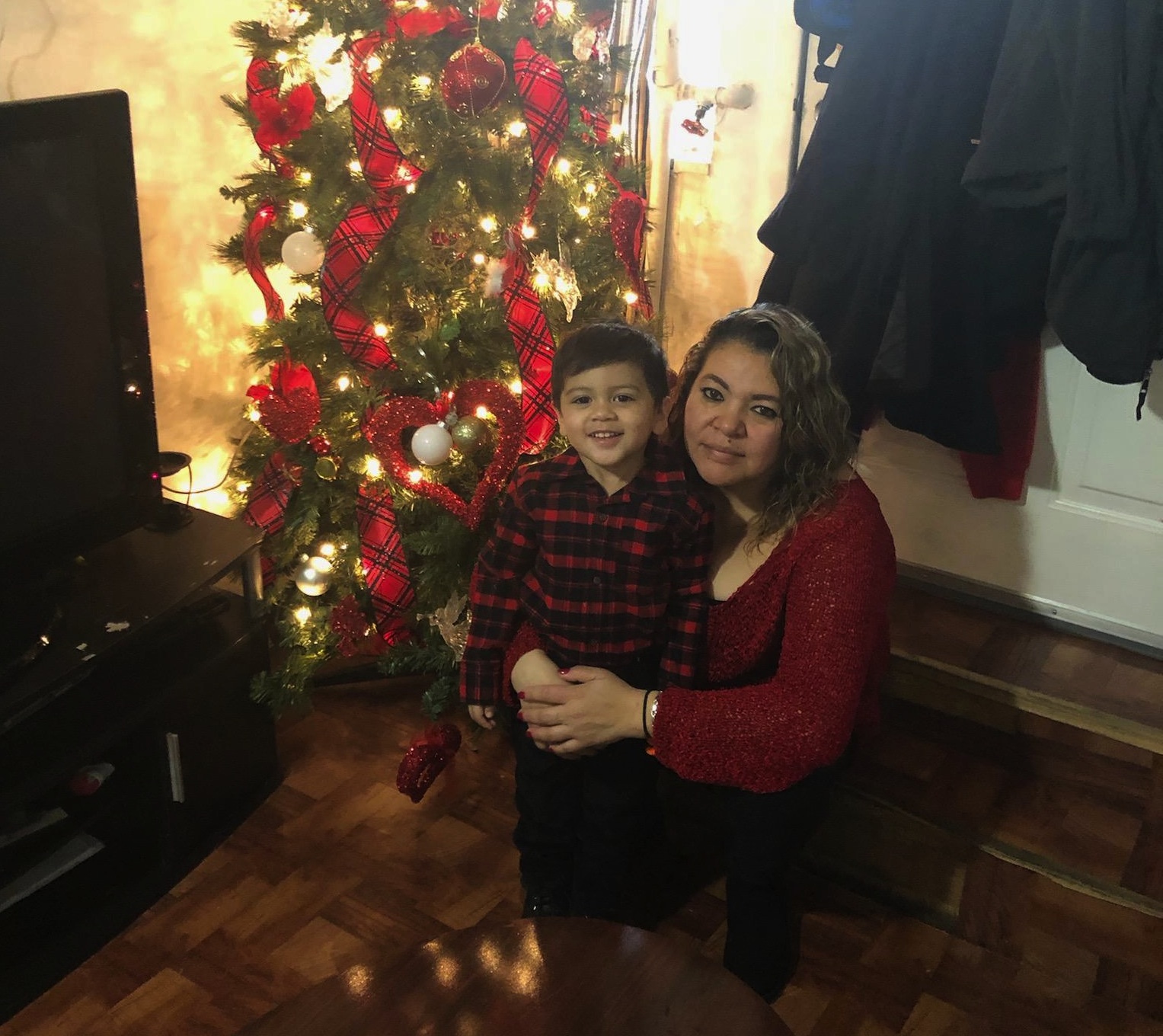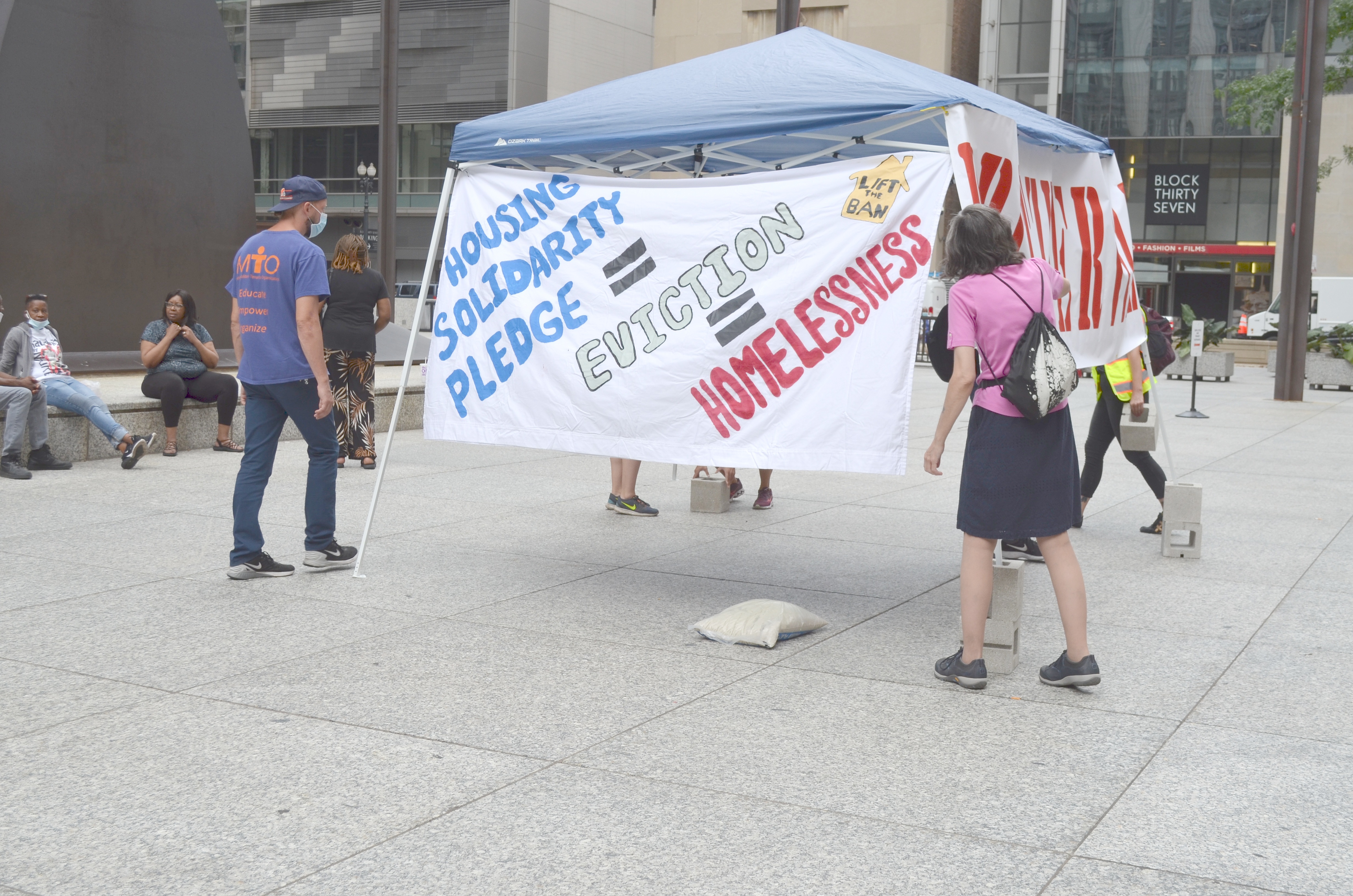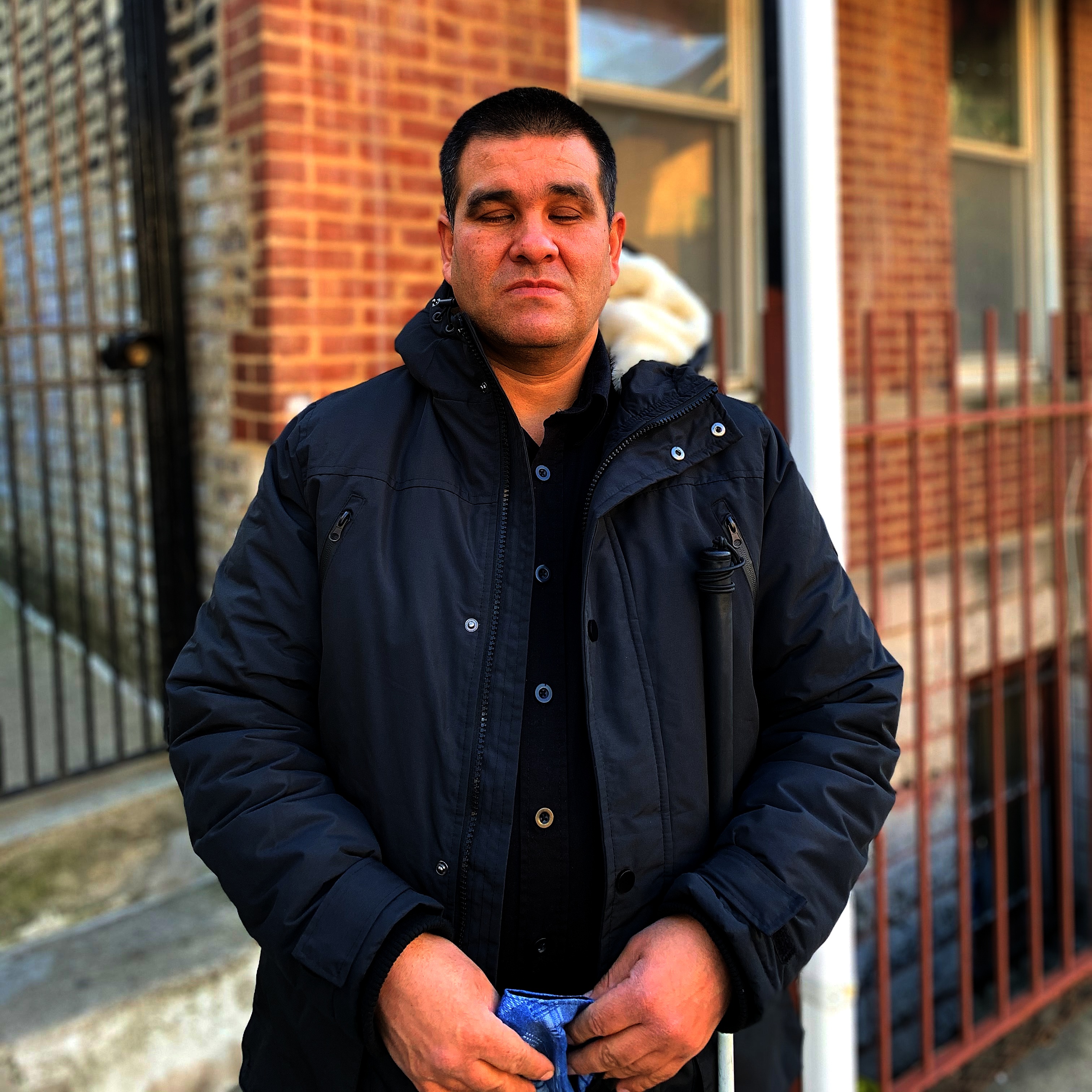Wave of housing evictions will increase Chicago’s homeless population, advocates fear
Amid the pandemic, tenant rights advocates say that once the moratorium on evictions is lifted, unemployed families will be at risk of homelessness unless the government takes action

Autonomous Tenants Union leaders educate the Albany Park community about their rights as tenants amid the coronavirus pandemic. (Courtesy ATU) Crédito: Cortesía
Thousands of Illinois renters who are jobless due to the pandemic are facing an uncertain 2021. Since the state’s stay-at-home order began in March of 2020 until today, many renters haven’t been able to pay their rent. For this reason, tenant and homeless rights organizations are pushing for federal and state financial aid to increase so that renters aren’t left in limbo before the moratorium on evictions ends.
Illinois Governor JB Pritzker first introduced a moratorium on evictions through an executive order in March, while the state was under a mandatory stay-at-home order. Since then, the governor has extended the moratorium nine times.
But the state moratorium on evictions due to inability to pay because of the crisis no longer protects tenants automatically as it once did. Starting Dec. 11, tenants are required to send a signed form to their landlords stating that the pandemic has prevented them from paying all or part of their rent.
To be eligible for eviction protection, a tenant must meet specific requirements. Those prerequisites include the inability to pay rent due to loss of income or health expenses because of the coronavirus, risk of becoming homeless, having to share a home, or move into another house where too many people reside together. Besides, an individual must not expect to earn more than $99,000 in 2020 ($198,000 for couples filing joint taxes), was not required to declare income in 2019, or received the federal stimulus check from the CARES Act in 2020. Renters should also make every effort possible to pay rent in partial payments.
If the tenant does not present the signed form to the lessor, the landlord can begin the eviction process. Pritzker extended the ban on evictions caused by the coronavirus pandemic in Illinois until Jan. 11.
Also, the new federal aid package approved by Congress includes a new federal moratorium on evictions, which will be in effect until Jan. 31, 2021.
‘Pritzker is making things more difficult’
Miguel Jimenez, a tenant organizer with the Metropolitan Tenants Organization (MTO), said that many renters are unaware of the amendment made by Governor Pritzker to that executive order and the new requirements. “Before you could reach a verbal agreement with the owner, everything was more flexible, now Governor Pritzker is making things more difficult for tenants affected by the pandemic.”
“At the beginning when the moratorium on evictions was established, the owner knew that he or she couldn’t make any legal moves to evict a tenant, but now they can if they don’t receive that statement [the tenant’s form],” Jimenez said to La Raza.
On the other hand, some homeowners approve Governor Pritzker’s initiative. They argue that they are also struggling to pay their mortgage and that there are tenants taking advantage of the moratorium to avoid paying rent.
Community organizers claim that federal, state, and municipal rental assistance programs have provided some relief, but it hasn’t been enough considering the large number of renters who need help. Organizers assure they will push the incoming Joe Biden Administration to provide greater assistance for tenants and landlords and resources for the homeless amid the pandemic.
Moreover, healthcare workers warn that evictions could increase the spread of the coronavirus.

Minorities affected by evictions
It’s estimated that more than 21,000 evictions could take place in the first three months of 2021, according to a Loyola University report published in December of 2020 titled “Eviction Filings, Unemployment and the Impact of COVID-19”.
Conducted by the Lawyers’ Committee for Better Housing, the research noted that evictions are more likely to occur in predominantly African-American and Latino communities than in mostly white areas.
These groups are also more likely to rent than whites. In addition, the majority of African-American and Latino renters in Chicago are burdened by rental costs compared to just 40 percent of white renters.
The Census’ Household Pulse Survey conducted on Oct. 14, which measured how the pandemic is affecting households across the country, revealed that more than half of African Americans and Latinos in the Chicago metropolitan area had experienced job loss since March 19 compared to 40 percent for whites.
Advocates push for eviction records to be sealed
Having an eviction application on a credit history can present obstacles for tenants trying to find housing, tenant advocates say. Given this, advocates are pushing a law to protect renters who have been evicted for unpaid rent due to the pandemic once the moratorium ends.
Each year, an estimated 15,091 people will end up with a public eviction record despite not having an eviction order or a lawsuit against them. This problem can have lasting consequences for a tenant, according to a report by the Lawyers’ Committee for Better Housing and Housing Action Illinois published in March 2018 titled “Prejudged the Stigma of Eviction Records”.
Landlords typically refuse to rent to anyone with an eviction request on their records, regardless of the case’s context or outcome, legal aid attorneys said.
In the report, researchers recommend Illinois lawmakers to enact a law to seal eviction records. A tainted credit report that includes an eviction presents significant obstacles for people trying to find housing; therefore, having a court seal an eviction record will keep it from becoming public.
Working to protect tenants
Some state legislators are considering to propose a law in Springfield in 2021 that will extend protections for people who have been affected by the coronavirus pandemic and who have not been able to pay their rent, state representative Delia Ramirez (D-Chicago) said.
Eviction records for unpaid rent remain in the renter’s credit history for seven years. A poor credit history that includes evictions also allows banks to decline mortgages, and landlords to deny rent because they are considered a high-risk lender or renter.
Ramirez is working on an emergency bill to protect tenants from discrimination after being evicted for nonpayment due to the pandemic. “This initiative seeks to seal the records to avoid discrimination once they want to rent an apartment,” she said.
“Eviction prevention is cheaper than helping someone who has been evicted. We have to help someone who is already evicted, and you have to prevent more people from being evicted,” Representative Ramirez said.

Approved ordinances amid the pandemic
To help tenants during the coronavirus pandemic, the Chicago City Council enacted the COVID-19 Eviction Protection Ordinance last June. Upon receiving a five-day notice, renters can send a written notification stating their inability to pay rent on time due to a coronavirus-related loss of income and enter a seven-day negotiation period with the landlord. Before the landlord terminates the rental agreement and evicts the tenant, both parties must engage in good-faith negotiations.
The Council also approved the Fair Notice Ordinance in July 2020 to give tenants more time to vacate a home if a landlord increases rent, fails to renew a lease, or terminates a multi-year or month-to-month lease.
Illegal threats
Still, tenants who have not paid their rent due to the pandemic have been evicted despite federal and state orders that would have supposedly kept them in their homes. Advocates say there have been cases in which landlords have threatened tenants to pressure them to leave the residence.
Ana Alonso, an organizer with Unete La Villita (Unite Little Village), said she is aware of cases in this southwest Chicago neighborhood where landlords are cutting off heat and electricity. “Homeowners are taking away basic services so that the house is unlivable so they can evict them faster. We are seeing a lot of this at Little Village,” Alonso said.
Luz Franco has been renting an apartment basement in the Brighton Park neighborhood of southwest Chicago for almost four years.
Franco works cleaning houses and offices, but she found another job at a packaging warehouse when she was laid off due to the pandemic. There, she said she contracted the coronavirus and had to quarantine to recover.
Franco was behind on rent for two months. She later spoke with the landlord assuring him she would pay half of the rent from one paycheck and the other half from another paycheck because she couldn’t pay the amount in full since she was sick and unable to work. “He told me no, that he needed the rent. He started arguing via text messaging and days later he cut off the electricity and the heating.”
To stay warm in the basement, she kept pots of boiling water on the stove and slept with layers of blankets.
She had to call the utility company to have the services reinstated. She also has diabetes and must have the electricity on to keep her insulin bottles refrigerated.
Franco said she knew about the moratorium on evictions, but she no longer felt comfortable living there and decided to move to another house.
She received assistance from the organization Unete La Villita and MTO, which also provided her with information about her rights. Franco filed a report with the City of Chicago and the Chicago Police Department. The landlord was fined for cutting off basic services and was cited with inspection violations.
A “lockout” is when the landlord forces a tenant to leave the premises without going to court first and illegally cuts off heat, electricity, water, changes locks, removes or damages belongings, and threatens or hurts a tenant.
“Homeowners can be arrested for failing to discontinue a home lockout. If the landlord tells the tenant ‘I’m gonna cut off electricity if you don’t pay me,’ even if he doesn’t do it, it’s a verbal threat and therefore it’s considered a lockout under Chicago municipal law,” said Jimenez, adding that communities must organize and understand their rights so they can defend themselves.
Although there are orders against evictions, there are homeowners who are illegally evicting their tenants and cutting off essential services, intimidating them to force them to leave the house, said Javier Ruiz, an eviction prevention organizer with MTO. He said the City is doing very little to curb those illegal lockouts.
“Nobody can evict [tenants] until there is a court process before a judge who gives the eviction order, which is then given to a deputy sheriff, who is the only person who can take a resident’s possessions or change the locks,” Antonio Gutierrez, co-founder of the Autonomous Tenants Union (ATU), said.
Illegal lockouts have always existed, but now it is being seen more in the wake of the pandemic, Ruiz said.
Moises Moreno, executive director of the Pilsen Alliance, said that instead of extending the moratorium on evictions in the state each month, Governor Pritzker should rather cancel rents and mortgages and lift bans on rent control.
“Extending the moratorium on evictions is not enough because people still have to pay what they owe and if people are not working, if there is not enough work, how are people going to pay? This is getting serious,” Moreno said.

Calling immigration is illegal
The Immigrant Tenant Protection Act was designed to prevent landlords in Illinois from evicting or retaliating against undocumented tenants simply because of their immigration status.
Landlords are prohibited by law from requiring tenants to disclose their immigration status, which is considered irrelevant to their role as tenants.
“Homeowners cannot call immigration to try to evict or harass a tenant, and doing so can have legal consequences,” Gutierrez said.
Tenants can form a union
ATU is a community organization established in the Albany Park neighborhood of northwest Chicago that supports tenants in creating their unions and provides them with resources and information.
“Creating a union based on the laws or policies that we have in the city of Chicago gives you more rights as a tenant… Once you are a union member, in addition that its members acquire more power as a group, a union gives you more protections when landlords want to evict or retaliate for organizing or talking to other neighbors,” Gutierrez explained to La Raza.
An example of a strong joint organization is the Chicago Tenant Movement, which was created to form a coalition made up of organizations, unions, and lawyers associations to provide a hotline to give renters resources and support, Gutierrez said.
For more information, visit chicagotenants.org. The phone number for free legal aid is 773-657-8700.
Evictions could increase homelessness
After living in shelters and on Chicago’s streets for more than a decade, Vicente Hernandez, 47, stresses the importance of having a home. He said that he was forced to leave his house where he lived with his relatives because they didn’t get along. He also felt discriminated against because he is blind.
“The homeless have an uncertain future. I have tried not to fall behind with my rent because if I’m late they will kick me out and I’ll be on the streets again. Tell me how I can live without a house,” Hernandez said.
He also has diabetes and was born blind. Even before the pandemic, he made a living working in low-paying temporary jobs. He said that sometimes it’s been difficult for him to earn enough money to pay for the basement room where he has lived for a year. “It is a place that is not suitable to live, but it is better than the streets.”
Hernandez decided to leave the streets of Chicago because of his diabetes. He remembers saying to himself: “I have to get myself a roof to live under so I can put my insulin in a place with a refrigerator, otherwise I’m going to die.”
He sometimes works with people who do renovations. Thanks to his bilingual abilities, he also gets gigs as an interpreter or a translator. But when there is no work, he said he lives off of people’s kindness. “Since the pandemic, I have not been able to have the income that I had before, which was not much, but it allowed me to pay my rent and buy some food. There are times when I’ve only had one meal because I haven’t had the money for more.”
Hernandez is a volunteer with the Chicago Coalition for the Homeless (CCH), where he advocates for the homeless’ rights and helps others with access to affordable housing.
In Chicago, there are 76,998 residents affected by homelessness, whether they live on the streets, in shelters, or temporary homes with family or friends, according to CCH. Twenty-three percent of them are Latino.
Homeless rights advocates believe Chicago’s homeless population will increase due to the pandemic crisis’ economic consequences.
Alyssa Rodriguez, a community organizer with CCH, said the Coalition compiled its most recent report from the Census Bureau 2018 data. Rodriguez believes that as a result of the pandemic, that number could increase in 2021 when the moratorium on evictions is lifted.
A count and survey from Point In Time from the Chicago Department of Family and Support Services (DFSS) to count the homeless found that about 5,290 people live on the streets or in shelters. These results were obtained from a count carried out on the night of Jan. 24, 2019.

According to Rodriguez, the Coalition defines a homeless population as people who live on the streets, in a shelter, or temporary housing with families and friends. However, city authorities consider someone homeless only if they live in a shelter or on the streets.
The City counts the homeless in January when those numbers are very low, Rodriguez said. “We live in the city of Chicago. Our winters are extremely cold compared to other cities. Nobody wants to live on the streets, many homeless prefer to live temporarily with family or friends during the winter.”
Counting people who live in shelters or on the streets in the middle of winter does not give a complete perspective of this problem in the city, Rodriguez said.
The Coalition offers free legal services, assistance in applying for the food stamp program, and educational workshops on homeless’ rights, to name a few.
Casa Norte, a nonprofit organization, has two emergency shelters in the Humboldt Park and Back of the Yards neighborhoods for homeless youth between 18 and 24. It also provides housing assistance through a program that offers government financial aid, among other services.
“The shelters are operating 24 hours a day because we are seeing that the numbers [during] the pandemic have risen in our communities,” said Jose Muñoz, executive director of Casa Norte.
When a person becomes infected with the coronavirus, the organization connects them with other providers dedicated to specifically helping these people, Muñoz said.
If a homeless person becomes infected with the virus, they can turn to A Safe Haven. This nonprofit organization assists anyone who has tested positive for the coronavirus and provides a place to quarantine.
Muñoz agreed with advocates that in addition to extending the moratorium on evictions due to the pandemic, the government must give financial assistance for renters who owe rent and landlords who are behind on mortgage payments. “If these homeowners cannot collect the rent to pay their mortgage and lose their building, developers are going to start buying. They are going to raise rents, and it will be more difficult for our communities to stay in that place. [Developers] will displace them.”
—
The production and dissemination of this story has been possible thanks to a grant from the Field Foundation of Illinois through its Media and Storytelling program. La Raza appreciates its support.




